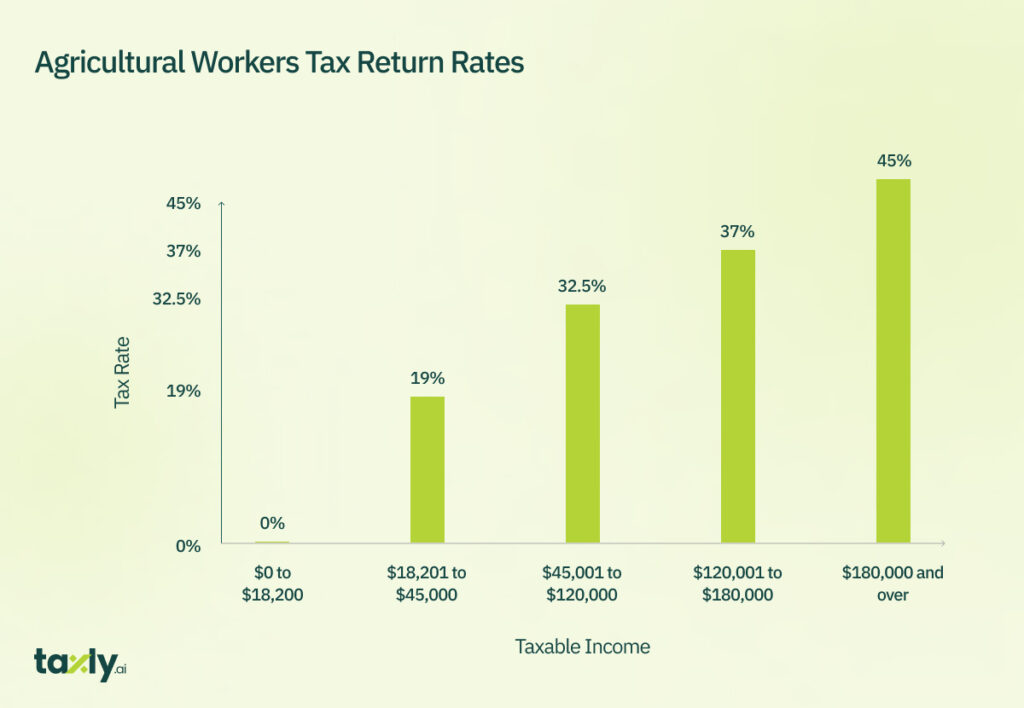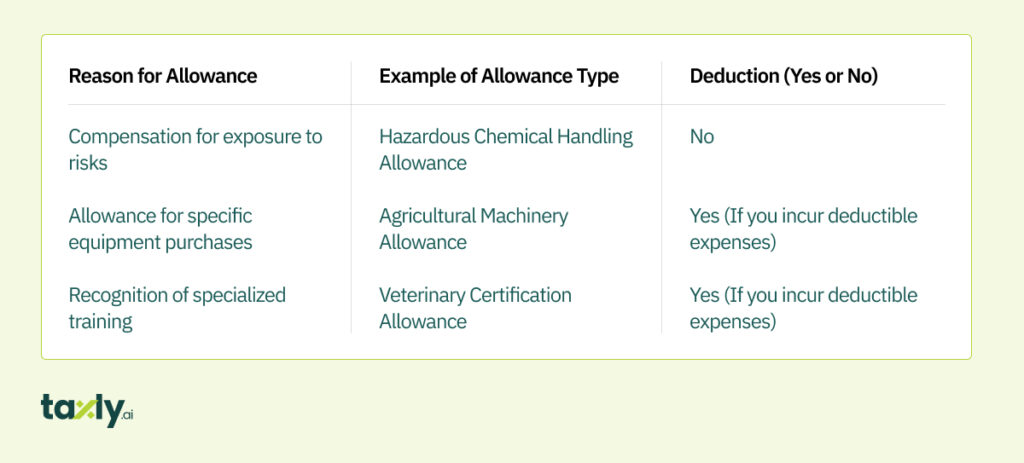The Australian Taxation Office (ATO) provides guidelines for agricultural workers tax return, deductions, and specific considerations. In Australia, agricultural workers are individuals employed in various sectors related to agriculture, farming, or primary production. They contribute to activities involved in crop cultivation, animal husbandry, forestry, fishing, and related industries. Agricultural workers can encompass various roles, such as:
- Farmers: Engaged in crop production, livestock rearing, or horticulture.
- Farm Laborers: Involved in day-to-day farming activities, including planting, harvesting, and animal care.
- Agricultural Technicians: Providing technical support in areas like soil testing, pest control, or agricultural equipment maintenance.
- Managers or Supervisors: Overseeing farm operations, managing staff, and ensuring production efficiency.
- Agribusiness Professionals: Working in areas like agricultural finance, marketing, or agribusiness consultancy.

Which Amounts do you Include in the Agricultural Workers Tax Return?
Salary and Wages:
This covers regular pay, bonuses, and any compensations received as part of employment.
Reported Allowances:
Any allowances reported by your employer need to be included as income. These allowances could be for work-related costs, compensations for specific job aspects (like handling pesticides), or for special skills or qualifications.
Suggested Read: Your Complete Guide to Work Related Business Trip Tax Deduction
Allowances Not on Income Statement (if claiming deduction):
If your employer doesn’t report certain allowances, but you’re using them for work-related expenses and intend to claim a deduction, include them as income when filing your taxes. Keep proper records of these expenses for deduction purposes.
Amounts You Don’t Include as Income in Tax Return (if not claiming a deduction):
Reimbursements: If your employer reimburses you for specific expenses you’ve incurred for work purposes, these reimbursements don’t need to be included as income in your tax return. However, you can’t claim further deductions for these reimbursed expenses.
Which Allowances to Include as Income in Agricultural Workers Tax Return?
All allowances your employer reports on your income statement or payment summary must be declared as income in your tax return.
Such as:
- Supporting work expenses like tools or equipment.
- Compensating for specific work conditions or industry peculiarities, such as handling pesticides.
- Acknowledging special duties, skills, or qualifications, like first aid certifications.
Which Allowances Are Not Included on Income Statement?
Some allowances might not appear on your income statement but can be found on your payslip. You don’t need to declare these unless you plan to claim a deduction.
If you spend the allowance on work-related expenses and don’t claim a deduction:
- You don’t declare the allowance as income in your tax return.
- You can’t claim deductions for the expenses covered by the allowance.
- No need to keep records of the amounts spent if not claiming a deduction.
Suggested Read: How to Lodge Tax Return in Australia?
How to Claim a Deduction for Allowances?
If the allowance covers deductible work-related expenses and you plan to claim a deduction:
- Include the allowance as income in your tax return.
- File a claim for the work expenses incurred.
- Maintain proper records of your expenses.
- Deductions claimed aren’t usually equal to the allowance received; they’re based on actual expenses incurred.

Let’s See an Example of How this Works
Scenario: Jim works as a farmhand in the agricultural industry. His employer provides him with an allowance of $200 per month to cover miscellaneous work-related expenses, like purchasing tools and equipment for his tasks.
Case 1: Not Claiming a Deduction
Jim spends the entire $200 allowance on work-related expenses like tools but doesn’t claim any deductions:
- Tax Return: He doesn’t need to declare this $200 allowance as income in his tax return since he’s not claiming a deduction.
- Deductions: As he isn’t claiming any deductions, he can’t further deduct the expenses covered by this allowance.
- Record Keeping: No need for Jim to maintain records of how he spends this allowance since he’s not aiming for deductions.
Case 2: Claiming a Deduction
Jim spends $250 on work-related expenses, exceeding his $200 allowance and decides to claim a deduction:
- Tax Return: He includes the $200 allowance as income in his tax return.
- Deductions: Jim claims a deduction for the $250 actual work-related expenses he incurred, not the full allowance.
- Record Keeping: Since he’s claiming deductions, Jim needs to maintain records (like receipts) for the $250 in expenses he incurred.
In both cases, Jim’s $200 allowance is treated differently based on whether he claims deductions for related expenses. Understanding these distinctions helps individuals determine how to report their allowances accurately based on their deduction intentions.
How to Complete an Agricultural Workers Tax Return?
1. Organize Income Documents:
Gather all income-related documents: pay stubs, W-2 forms, income statements, and any additional documents detailing wages, bonuses, compensations, and reported allowances received from agricultural work.
2. Record Work-Related Expenses:
Keep a detailed record of work-related expenses throughout the year. This includes receipts and documentation for tools, equipment, vehicle use, training costs, or any other expenses directly tied to agricultural work.
3. Categorize Income and Expenses:
Separate and categorize income and expenses related to agricultural work. This organization simplifies the process when filling out tax forms.
4. Understand Allowances:
Identify which allowances are reported on income statements or payment summaries. Determine if these allowances are for specific expenses or compensations related to work conditions.
5. Determine Deductions:
Review allowable deductions related to agricultural work. Deductible expenses might include farm supplies, equipment maintenance, vehicle expenses for farm-related travel, and costs associated with certifications or training directly benefiting your work.
6. Keep Detailed Records for Deductions:
Maintain thorough records for claimed deductions. This includes keeping receipts, invoices, logs, or any documentation supporting expenses claimed for deductions.
7. Use AI Tax App or Professional Assistance:
Consider using an AI Tax App tailored for agricultural workers or seek guidance from a tax professional specialized in agricultural taxes. They can assist in accurately reporting income, identifying deductions, and ensuring compliance with industry-specific regulations.
8. Review and File Timely:
Review your completed tax return to ensure accuracy and completeness. File your tax return on time to avoid penalties or interest charges, considering any available extensions if necessary.
The Bottomline
Agricultural workers tax return in Australia includes all income earned from farming activities, including wages, bonuses, and reported allowances. Include allowances specified on income statements in the tax return. Determine if allowances cover work-related expenses; if so, declare them as income and claim deductions for eligible expenses. Maintain precise records for allowance-related deductions. Refer to ATO guidelines, and consult a tax professional if needed for accurate reporting and maximizing deductions tied to agricultural work.
Discover More Topics


Comments are closed